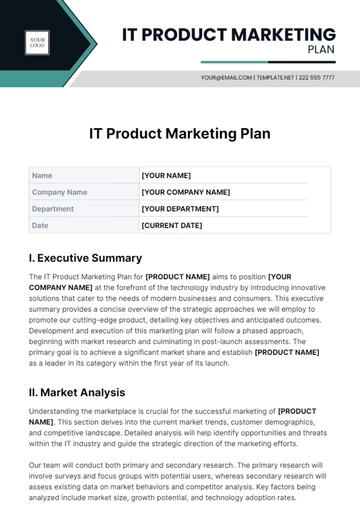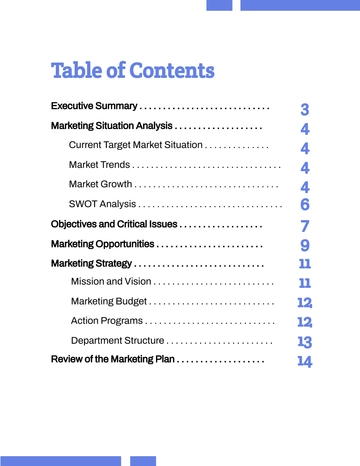Free Channel Partner Marketing Plan

I. Executive Summary
In today's rapidly evolving market landscape, strategic partnerships play a crucial role in driving sustainable growth and market expansion. [Your Company Name]'s Channel Partner Marketing Plan aims to cultivate mutually beneficial relationships with key partners within the industry, leveraging their networks and expertise to amplify brand visibility and enhance customer engagement. By collaborating with distributors, retailers, and other channel partners, we seek to create synergistic alliances that drive revenue growth and foster brand loyalty.
II. Objectives
A. Partner Identification and Selection
Distributors: Companies that specialize in distributing products to retail stores or directly to consumers, helping the company reach a wider audience and expand its market presence.
Retailers: Physical or online stores that sell the company products directly to consumers, providing valuable points of sale and enhancing brand visibility.
Sports Teams and Athletes: Partnering with professional sports teams or individual athletes can help the company showcase its products in high-profile events and competitions, while also leveraging the influence and credibility of athletes to promote its brand.
Fitness and Wellness Organizations: Collaborating with fitness clubs, gyms, or wellness centers can enable the company to promote its products to health-conscious consumers and athletes seeking performance-enhancing gear.
Fashion and Lifestyle Brands: Partnering with fashion labels or lifestyle brands can help the company expand its reach beyond sports and athletic wear, tapping into new markets and consumer segments.
Evaluate potential partners based on criteria such as market influence, customer base, and compatibility with the company's product portfolio. Partners should share the company's commitment to innovation, quality, and customer satisfaction.
B. Partner Enablement and Empowerment
Training Workshops: The company could organize regular training workshops or seminars for its partners to educate them about the latest product offerings, technology advancements, industry trends, and sales techniques. These workshops could be conducted in person or virtually to accommodate partners from different geographical locations.
Sales Enablement Tools: The company may provide its partners with access to a variety of sales enablement tools, such as sales playbooks, product demos, competitive analysis reports, and customer success stories. These tools can help partners effectively communicate the value proposition of Nike products and overcome objections during the sales process.
Marketing Resources: The company could offer partners access to a wide range of marketing resources and collateral, including branded templates, imagery, videos, and advertising materials. Partners can leverage these resources to create compelling marketing campaigns, promotions, and advertisements that align with Nike's brand guidelines and messaging.
Dedicated Portal: The company could establish a dedicated online portal or platform where partners can access all the necessary resources, training materials, product information, and sales support materials in one centralized location. This portal could also facilitate communication and collaboration between Nike and its partners, allowing for seamless information sharing and coordination of marketing initiatives.
C. Joint Marketing Campaigns
Distributors and Retailers: Collaborating with distributors and retailers who have insights into local market trends and consumer preferences can help tailor marketing campaigns to specific regions or demographics.
Athletes and Sports Teams: Partnering with athletes or sports teams can lend authenticity and credibility to marketing campaigns, especially for sports-related products or events.
Fashion Designers and Influencers: Teaming up with fashion designers or influencers who resonate with the company's target audience can help create compelling and trendy marketing content that appeals to fashion-forward consumers.
III. Strategies
A. Tailored Marketing Materials
Marketing assets such as product brochures, social media content, and email templates to reflect partner branding and messaging. This ensures consistency and alignment with partner values and target audience preferences.
Co-branded marketing materials that highlight the partnership between [Your Company Name] and its channel partners. This reinforces the strength of the partnership and enhances brand credibility and recognition.
B. Co-Branding Opportunities
Opportunities for co-branding initiatives, including limited-edition product launches, exclusive events, and co-sponsored community initiatives. These initiatives can create excitement and exclusivity around [Your Company Name]'s products, driving demand and brand loyalty.
Leverage partner networks to amplify brand presence in niche markets and target demographics. By tapping into partner expertise and networks, [Your Company Name] can effectively reach and engage with diverse customer segments.
C. Performance Tracking and Optimization
Implement a robust analytics framework to track partner performance, campaign effectiveness, and customer engagement metrics. This data-driven approach allows [Your Company Name] to measure the impact of marketing initiatives and optimize strategies for maximum results.
Performance reviews to identify areas for improvement and optimize marketing strategies for maximum impact. By analyzing performance metrics and soliciting feedback from partners, [Your Company Name] can continuously refine and enhance its channel partner marketing efforts.
IV. Implementation Plan
A. Partner Onboarding
Conduct comprehensive onboarding sessions to introduce partners to [Your Company Name]'s brand values, product offerings, and partnership benefits. This ensures that partners are aligned with [Your Company Name]'s brand ethos and understand the value proposition of the partnership.
Assign dedicated account managers to provide ongoing support and guidance throughout the onboarding process. These account managers serve as a point of contact for partners, offering assistance and addressing any questions or concerns that may arise.
B. Training and Development
A variety of training resources, including online courses, in-person workshops, and product certification programs. This comprehensive training program equips partners with the knowledge and skills they need to effectively promote and sell [Your Company Name]'s products.
Partners with access to a knowledge base and support resources to facilitate continuous learning and skill development. This ensures that partners have access to up-to-date information and resources to support their sales and marketing efforts.
C. Campaign Execution
Collaborate closely with partners to develop and execute joint marketing campaigns aligned with strategic objectives and market trends. By leveraging partner expertise and insights, [Your Company Name] can create compelling and relevant marketing initiatives that resonate with target audiences.
Provide partners with access to marketing automation tools and campaign management platforms to streamline execution and optimize results. This technology enables partners to efficiently manage and track their marketing efforts, driving efficiency and effectiveness.
V. Measurement and Evaluation
A. Key Performance Indicators (KPIs)
Track KPIs such as lead generation, conversion rates, revenue contribution, and customer satisfaction scores. These metrics provide valuable insights into the effectiveness of marketing initiatives and partner performance.
Monitor partner engagement levels and feedback to assess program effectiveness and identify areas for improvement. By soliciting feedback from partners and analyzing engagement metrics, [Your Company Name] can identify opportunities to enhance partner satisfaction and performance.
B. Performance Reviews
Quarterly performance reviews with partners to evaluate campaign performance, share insights, and address any challenges or concerns. These reviews provide an opportunity to assess progress against objectives and identify areas for optimization.
Solicit feedback from partners through surveys and focus groups to gather insights and suggestions for program enhancements. By actively seeking input from partners, [Your Company Name] can ensure that its channel partner marketing program remains relevant, effective, and aligned with partner needs and expectations.
VI. Conclusion
[Your Company Name]'s Channel Partner Marketing Plan represents a strategic roadmap for cultivating strong and mutually beneficial partnerships that drive sustainable growth and market expansion. By empowering our channel partners with the tools, resources, and support they need to succeed, we are confident in our ability to achieve our shared goals and deliver exceptional value to customers worldwide. Together, we will continue to innovate, collaborate, and elevate the [Your Company Name] brand to new heights of success.
- 100% Customizable, free editor
- Access 1 Million+ Templates, photo’s & graphics
- Download or share as a template
- Click and replace photos, graphics, text, backgrounds
- Resize, crop, AI write & more
- Access advanced editor
Enhance and Discover the Channel Partner Marketing Plan Template from Template.net - your ultimate solution for strategic marketing collaboration! Crafted for versatility, this editable and customizable template empowers you to tailor your partner's marketing strategies effortlessly. Seamlessly editable in our AI Editor Tool, it streamlines your planning process for unparalleled success. Elevate your partnerships today.





























